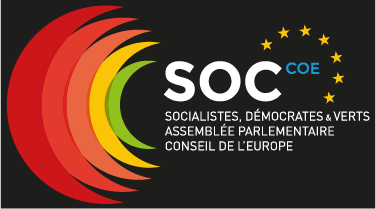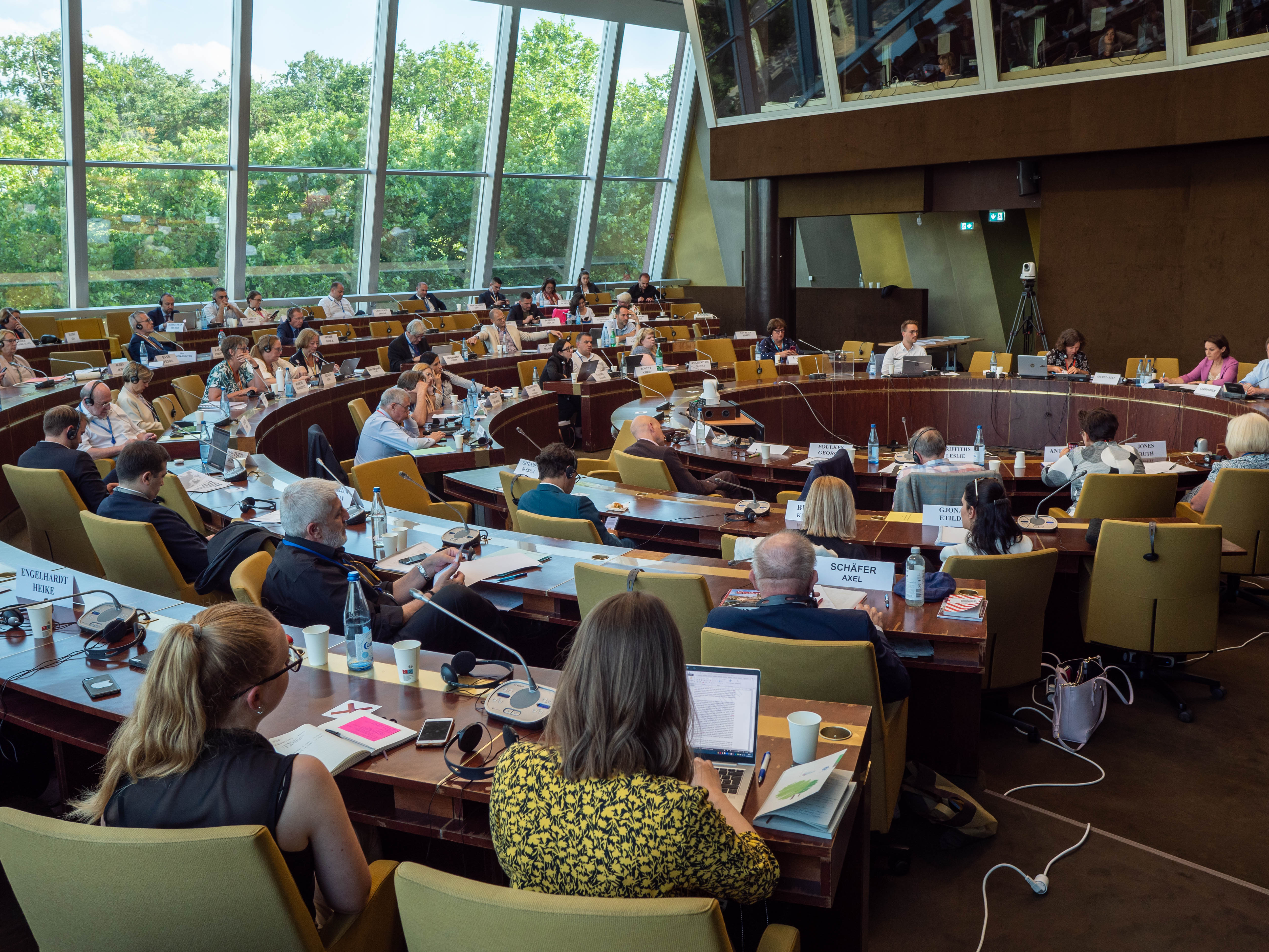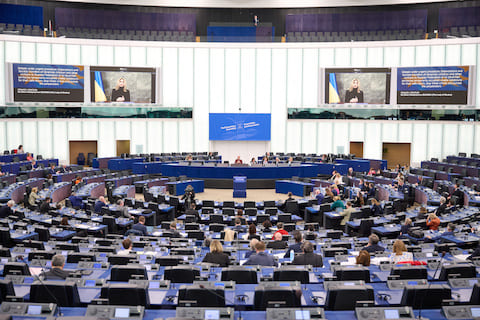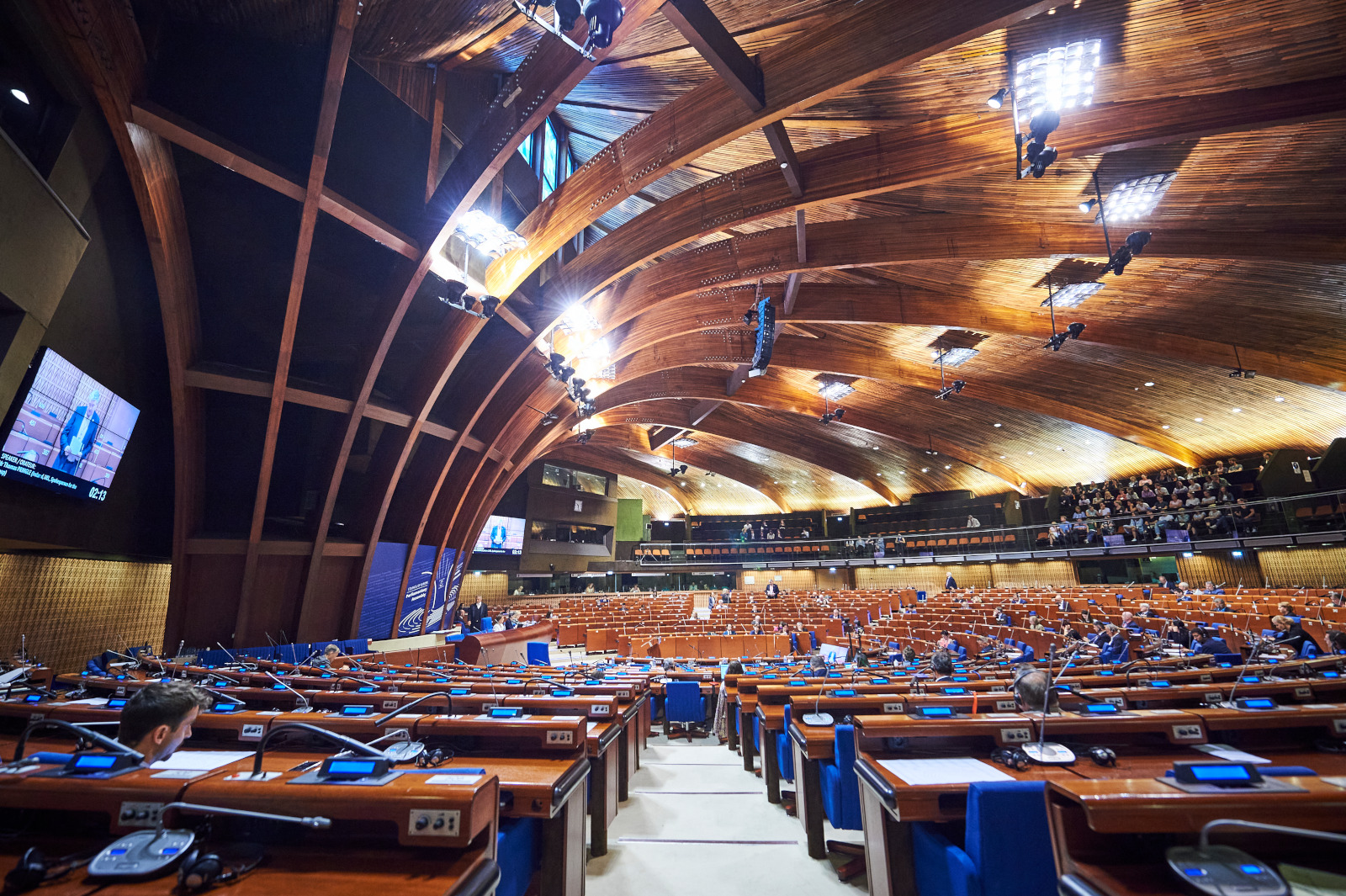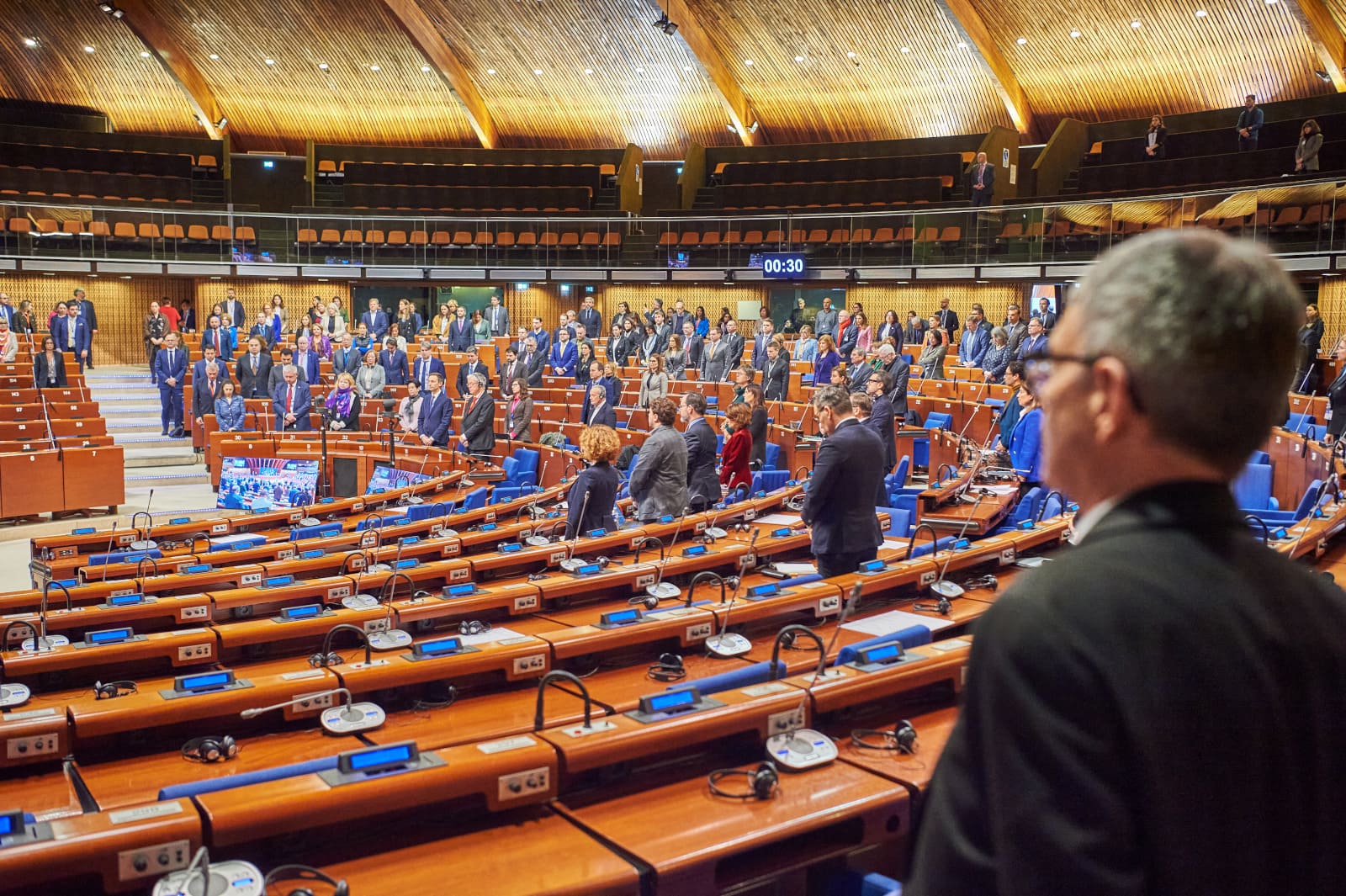
The Winter plenary session of the Parliamentary Assembly of the Council of Europe (PACE) was held in Strasbourg from 23 to 27 January 2023.
Monday 23 January 2023
Election of the President of the Assembly
Tiny Kox (Netherlands, UEL) was re-elected with the absolute majority of the votes cast for a second one-year term as President of the Parliamentary Assembly of the Council of Europe (PACE). Addressing Russia’s unilateral war aggression against Ukraine in his speech following his re-election, the President reiterated that “this war should never, ever, become a normality” and asked the members of the Assembly to continue to intensify its functioning “as one of the most relevant European agoras”.
Progress report of the Bureau and the Standing Committee
Speaking on behalf of the SOC group, Petra Bayr congratulated Mr Tiny Kox for his re-election and expressed her gratitude for the fact that the new requirements regarding gender representation in the Parliamentary Assembly are for the first time in force, and all delegations, as well as the Monitoring Committee, the Committee on Rules of Procedure, and the Committee on the Election of Judges to the European Court of Human Rights have a percentage of women greater than or equal to 30%.
Addressing the issue of Daesh foreign fighters and their families returning from Syria and other countries to the member States of the Council of Europe
The Assembly discussed the report prepared by Pieter Omtzigt (Netherlands, EPP/CD), concerning the member States’ response to acts of genocide and other serious crimes under international law, which have been perpetrated by individuals who act in the name of Daesh. Recognising that the continued detention and prosecution of Daesh foreign fighters in Syria or Iraq is not an option, the Assembly agreed that the “best solution” would be their prosecution before an international tribunal. Addressing the complex nature of the repatriation of Daesh fighters’ children, who, according to PACE, should in principle be repatriated with their mothers or primary care givers, Stefan Schennach, rapporteur for opinion, reiterated that “children must not be punished for the crimes of their parents”.
Tuesday 24 January 2023
Conflict-related sexual violence
Based on the report prepared by Petra Bayr, the Assembly adopted a resolution that strongly condemns conflict-related sexual violence – a war crime under international law, which can also be used as a means of ethnic cleansing. The Assembly stressed that conflict-related sexual violence, although traditionally viewed as an inevitable by-product of war, is nonetheless a preventable phenomenon. To this end, PACE called on member States to work on prevention, both in peacetime and in situations of conflict, by: ratifying the Rome Statute; using universal jurisdiction in order to prosecute perpetrators who have committed crimes of conflict-related sexual violence; ratifying and implementing the Istanbul Convention. Recalling that conflict-related sexual violence is one of the results of the crime of aggression against Ukraine, PACE called on member States to support the setting up of a special ad hoc international tribunal to punish the perpetrators of such crimes, and to introduce survivor-centred measures which will “ensure women’s access to sexual and reproductive health and rights services”.
Address: Ms Annalena Baerbock, Minister for Foreign Affairs of Germany
Addressing the members of the Assembly, the German Foreign Minister, Annalena Baerbock, expressed her conviction that the Council of Europe today “is more important than ever”. In her inspiring speech to PACE, the Minister reminded member States that Russia’s war of aggression “is a war against the common European peace order” and that “women’s rights are yardsticks for the state of our democracies”. In view of the Fourth Summit of the Council of Europe in Reykjavik, the Minister stressed that the implementation of the European Court of Human Rights’ judgements is “a legal obligation” and not a wishlist, and she invited all member States to sign and ratify the Istanbul Convention. Addressing Selin Sayek Böke’s (spokesperson for the SOC group) question concerning the concrete goals of the Summit, the German Foreign Minister identified the following three: to increase the budget of the Council and the Court; to focus on acting against human rights violations; to pave the way for a new generation of human rights, by drafting new conventions with regard to the environment and to artificial intelligence.
The Reykjavik Summit of the Council of Europe: United around values in the face of extraordinary challenges
By approving a recommendation on the basis of a report prepared by Fiona O’Loughlin (Ireland, ALDE), PACE set out its proposals for the Reykjavik Summit and expressed its firm support for Ukraine. The rapporteur reiterated that “the pursuit of peace based upon justice and international co-operation is a vital precondition for the preservation of human society and civilisation” and presented the means through which the Council of Europe can put “people’s interests, concerns and expectations back to the forefront of the mission of the Organisation”. Ahmet Ünal Çeviköz, spokesperson for the SOC group, praised the rapporteur for her meticulous report and underlined the crucial importance of enhancing the political dimension of the Council of Europe through the representation of its member States at the level of Heads of government and State. To this end, he invited the Assembly to support unanimously the report and to “stand again, as a renewed Council, with a stronger mandate”.
Wednesday 25 January 2023
Environmental impact of armed conflicts
The Assembly discussed the report prepared by John Howell (United Kingdom, EC/DA), which explored in great detail the interrelationship between human rights and the environment in the context of armed conflicts and their aftermath. By approving unanimously a recommendation and a resolution based on the report, PACE took the lead in advocating for the recognition of ecocide –the deliberate severe destruction or deterioration of nature– as a crime under international law. Jeremy Corbyn, spokesperson for the SOC group, welcomed warmly the report and its recommended steps for consolidating a legal framework that will enhance the protection of the environment.
Current affairs debate: Recent tensions between Pristina and Belgrade
PACE held a current affairs debate on the recent tensions between Pristina and Belgrade. Piero Fassino, spokesperson for the SOC group, reminded the Assembly that “the conflict between Kosovo and Serbia is a conflict that concerns not only the two countries, the two peoples, but the entire region and it weakens the stability of the Western Balkans”. Mr Fassino identified two main points of conflict: the status of Kosovo in international institutions, such as the Council of Europe; and the status of the Serbian minority living around Mitrovica in northern Kosovo, whose autonomy is refused by Kosovo. In view of the complexity of the situation, Piero Fassino underlined the Council of Europe’s responsibility to promote dialogue that would establish good relations between Serbia and the Assembly of the Republic of Kosovo.
Joint debate: The Istanbul Convention: progress and challenges / The role and responsibility of men and boys in stopping gender-based violence against women and girls / Finding solutions for marital captivity
By adopting in this very important joint debate the texts of the reports prepared by Zita Gurmai (Hungary, SOC), Petra Stienen (Netherlands, ALDE) and Margreet De Boer (Netherlands, SOC), PACE condemned gender-based violence against women and girls, and paved the way forward for its eradication.
SOC rapporteur Zita Gurmai reminded the Assembly that, despite Istanbul Convention’s achievements, “alarmingly high levels of violence and tragic femicides persist, harming and killing women and girls in all their diversity”. To this end, she called on member States who haven’t yet ratified the Istanbul Convention to do so without delay and she invited States parties to the Convention to use as a guide the evaluation reports by the Group of Experts on Action against Violence against Women and Domestic Violence (GREVIO) to step up the implementation of the Convention’s provisions.
The crucial role of men and boys in the fight against gender-based violence was highlighted in Petra Stienen’s inclusive report, which identified the rejection of harmful masculinities and the promotion of mindful masculinities as essential steps in achieving gender equality. Speaking in the name of the SOC group, Frank Schwabe praised the rapporteur and reiterated that “a debate about gender-based violence is not a debate just for women. There is a common responsibility and especially a responsibility for men.”
The widespread, yet frequently ignored in public policymaking, phenomenon of marital captivity –which can lead to violations of provisions of the Istanbul Convention or the European Convention on Human Rights– was discussed next in the Assembly. On the basis of the report prepared by Margreet De Boer, PACE adopted a resolution that proposes a series of measures to prevent marital captivity and to protect its victims, by taking into consideration “the different legal and practical circumstances in which marital captivity can arise”, as well as religion’s vital role in many people’s lives.
The Istanbul Convention: progress and challenges: Assembly’s voting results
The role and responsibility of men and boys in stopping gender-based violence against women and girls: Assembly’s voting results
Finding solutions for marital captivity: Assembly’s voting results
Thursday 26 January 2023
Debate under urgent procedure: Legal and human rights aspects of the Russian Federation’s aggression against Ukraine
By unanimously approving a resolution based on a report prepared by Damien Cottier (Switzerland, ALDE), PACE urged the creation of a special international criminal tribunal to prosecute and punish the crime of aggression against Ukraine. The Assembly condemned “the numerous atrocities and violations of international humanitarian law committed by Russian forces or affiliated groups in Ukraine” and informed member States on the “growing evidence that the official Russian rhetoric contains elements of public incitement to genocide or genocidal intent”. To this end, PACE invited member States to support the International Criminal Court Prosecutor’s investigation of the situation in Ukraine and called for the setting up of an international compensation mechanism for Ukraine. Addressing the Assembly, Oleksandra Matviichuk, Head of Ukrainian human rights NGO Center for Civil Liberties and 2022 Nobel Peace Prize laureate, called on member States’ to “break this circle of impunity, not only for Ukrainians –not only for the other people who suffered from Russian brutality– but for the people who can become the next target of Russian aggression – and prevent it, this time”. Speaking on behalf of the SOC group, Sunna Ævarsdóttir reminded member States that “impunity for war crimes is a driving factor for war crimes” and asked all the members of PACE to support this very important report.
Current affairs debate: Addressing the humanitarian consequences of the blockade of the Latchin corridor
Pierre-Alain Fridez opened the current affairs debate regarding the humanitarian consequences of the blockade of the strategic location of the Latchin corridor by Azerbaijani nationals. According to him, “the goal today, the hope that we can formulate, is an immediate normalisation of the situation with effective measures to restore the possibilities of movement in the Latchin corridor and solve as soon as possible the problems of supply of food, medicine, energy means and thus avoid a humanitarian drama”. Constantinos Efstathiou, spokesperson for the SOC group, expressed his deep concern over the humanitarian crisis that can potentially emerge from the restrictions to freedom of movement in this strip of land – the sole road connecting Armenia to Nagorno-Karabakh, and invited member States to “call on Azerbaijani authorities to ensure freedom and security of movement along the Latchin corridor, in accordance with the trilateral statement of 9 November 2020”.
Friday 27 January 2023
Emergence of lethal autonomous weapons systems (LAWS) and their necessary apprehension through European human rights law
The Assembly discussed the risks posed by the emergence of weapon systems that can select and attack targets without human intervention. Based on the report prepared by Damien Cottier (Switzerland, ALDE), PACE adopted a resolution that aims for “a fair balance between maintaining military competitiveness and protecting human rights”. The Assembly supported a solution that contains two components: the universal recognition of fully autonomous lethal weapons systems’ inconsistency with international humanitarian and human rights law, and their subsequent prohibition; the development of a legal framework for other, partially autonomous lethal weapons systems – eventually laid down in a legal binding international instrument and, in the meantime, in the form of a non-binding code of conduct. Christophe Lacroix, spokesperson for the SOC group, congratulated the rapporteur for his work on the report and underlined the continuous need for an international framework to regulate LAWS “so that the coldness of a machine never, ever prevails over human reason”.

